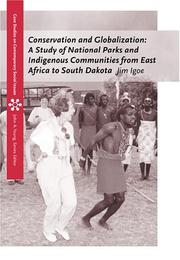| Listing 1 - 6 of 6 |
Sort by
|
Book
ISBN: 0816543453 Year: 2021 Publisher: [s.l.] : University of Arizona Press,
Abstract | Keywords | Export | Availability | Bookmark
 Loading...
Loading...Choose an application
- Reference Manager
- EndNote
- RefWorks (Direct export to RefWorks)
Today crisis appears to be the normal order of things. We seem to be turning in widening gyres of economic failure, species extinction, resource scarcity, war, and climate change. These crises are interconnected ecologically, economically, and politically. Just as importantly, they are connected-and disconnected-in our imaginations. Public imaginations are possibly the most important stage on which crises are played out, for these views determine how the problems are perceived and what solutions are offered. In The Nature of Spectacle, Jim Igoe embarks on multifaceted explorations of how we imagine nature and how nature shapes our imaginations. The book traces spectacular productions of imagined nature across time and space-from African nature tourism to transnational policy events to green consumer appeals in which the push of a virtual button appears to initiate a chain of events resulting in the protection of polar bears in the Arctic or jaguars in the Amazon rainforest. These explorations illuminate the often surprising intersections of consumerism, entertainment, and environmental policy. They show how these intersections figure in a strengthening and problematic policy consensus in which economic growth and ecosystem health are cast as mutually necessitating conditions. They also take seriously the potential of these intersections and how they may facilitate other alignments and imaginings that may become the basis of alternatives to our current socioecological predicaments.

ISBN: 0534613179 Year: 2004 Publisher: London : Thomson,
Abstract | Keywords | Export | Availability | Bookmark
 Loading...
Loading...Choose an application
- Reference Manager
- EndNote
- RefWorks (Direct export to RefWorks)
Globalization --- Indigenous peoples --- National parks and reserves --- Nature conservation --- Environmental aspects. --- Ecology. --- Social aspects.
Multi
ISBN: 9780816543458 0816543453 Year: 2021 Publisher: [s.l.] : University of Arizona Press,
Abstract | Keywords | Export | Availability | Bookmark
 Loading...
Loading...Choose an application
- Reference Manager
- EndNote
- RefWorks (Direct export to RefWorks)
Today crisis appears to be the normal order of things. We seem to be turning in widening gyres of economic failure, species extinction, resource scarcity, war, and climate change. These crises are interconnected ecologically, economically, and politically. Just as importantly, they are connected-and disconnected-in our imaginations. Public imaginations are possibly the most important stage on which crises are played out, for these views determine how the problems are perceived and what solutions are offered. In The Nature of Spectacle, Jim Igoe embarks on multifaceted explorations of how we imagine nature and how nature shapes our imaginations. The book traces spectacular productions of imagined nature across time and space-from African nature tourism to transnational policy events to green consumer appeals in which the push of a virtual button appears to initiate a chain of events resulting in the protection of polar bears in the Arctic or jaguars in the Amazon rainforest. These explorations illuminate the often surprising intersections of consumerism, entertainment, and environmental policy. They show how these intersections figure in a strengthening and problematic policy consensus in which economic growth and ecosystem health are cast as mutually necessitating conditions. They also take seriously the potential of these intersections and how they may facilitate other alignments and imaginings that may become the basis of alternatives to our current socioecological predicaments.
Book
ISBN: 0816537542 Year: 2017 Publisher: Tucson : Baltimore, Md. : The University of Arizona Press, Project MUSE,
Abstract | Keywords | Export | Availability | Bookmark
 Loading...
Loading...Choose an application
- Reference Manager
- EndNote
- RefWorks (Direct export to RefWorks)
"A thoughtful treatise on how popular representations of nature, through entertainment and tourism, shape how we imagine environmental problems and their solutions"--Provided by publisher.
Capitalism. --- Spectacular, The. --- Ecotourism. --- Nature conservation --- Economic aspects.

ISBN: 1594600171 Year: 2005 Publisher: Durham Carolina academic press
Abstract | Keywords | Export | Availability | Bookmark
 Loading...
Loading...Choose an application
- Reference Manager
- EndNote
- RefWorks (Direct export to RefWorks)
Book
ISBN: 9781844074419 9781844074402 9781849772075 9781136560521 9781136560569 9781136560576 Year: 2008 Publisher: Londres : Earthscan,
Abstract | Keywords | Export | Availability | Bookmark
 Loading...
Loading...Choose an application
- Reference Manager
- EndNote
- RefWorks (Direct export to RefWorks)
#SBIB:39A4 --- #SBIB:327.7H42 --- #SBIB:35H434 --- Protected areas --- Reserves (Protected areas) --- Toegepaste antropologie --- Specifieke internationale organisaties en samenwerking: milieu --- Beleidssectoren: milieubeleid en ruimtelijke ordening --- Economic aspects. --- Social aspects. --- Political aspects. --- Protected species --- Indigenous knowledge --- Lands, Preserved --- Lands, Protected --- Preserved lands --- Protected lands --- Public lands --- Economic aspects --- Political aspects --- Social aspects --- Natural resources --- Resource allocation --- Resource conservation --- resource management --- Nature conservation --- world --- IUCN
| Listing 1 - 6 of 6 |
Sort by
|

 Search
Search Feedback
Feedback About UniCat
About UniCat  Help
Help News
News